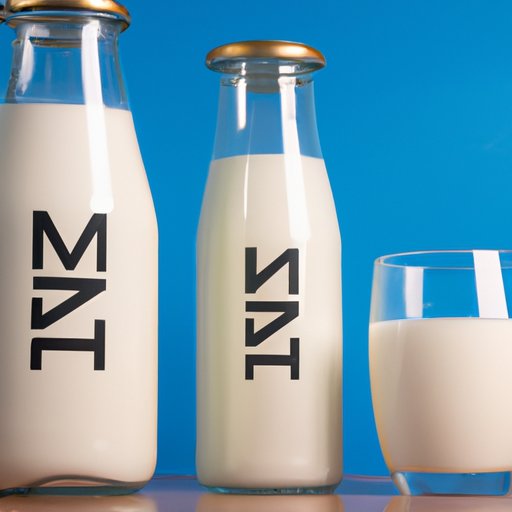
I. Introduction
There is a common belief that milk may hinder weight loss. However, milk can be an excellent source of protein and other nutrients, making it a great addition to a well-balanced diet. In this article, we will explore the different types of milk and how they can fit into your weight loss goals.
II. Skim, 2%, or Whole Milk: Which Milk Fits Your Weight Loss Goals?
Skim milk, 2% milk, and whole milk differ in their fat content. Skim milk has the least amount of fat, followed by 2% milk, and whole milk has the highest fat content. Choosing a type of milk depends on your weight loss goals and dietary preferences. Skim milk is the best option if you are looking to lose weight, as it is low in calories and fat. However, if you prefer the taste of 2% or whole milk, make sure to account for the extra calories and fat in your daily diet plan.
III. The Milk Debate: Does Dairy Help or Hinder Your Weight Loss Goals?
There are benefits and drawbacks to consuming milk for weight loss. Milk is a rich source of protein, which helps support muscle mass and promote satiety. Milk is also a good source of calcium, which is essential for bone health. However, milk contains lactose, which may cause digestive issues for some people. Additionally, the high lactose content in milk may increase insulin and inflammation levels in the body. In general, consuming moderate amounts of milk is beneficial for weight loss as long as it fits into your overall diet plan.
IV. A Comprehensive Guide to Dairy-Free Milk Alternatives for Weight Loss
For those who are lactose intolerant or prefer to avoid dairy, there are many dairy-free milk alternatives. Almond milk, soy milk, and oat milk are popular choices. While these milk alternatives are typically lower in calories and fat than dairy milk, make sure to choose unsweetened varieties to keep added sugars to a minimum. Additionally, some milk alternatives may not provide the same nutritional benefits as dairy milk, so pay attention to added vitamins and minerals on the label.
V. The Science Behind Milk and Weight Loss: What the Experts Say
Research studies have shown mixed results regarding the relationship between milk and weight loss. Some studies have suggested that consuming milk can support weight loss goals, while others have shown no significant impact. Experts in the field suggest that consuming moderate amounts of milk as part of a balanced diet can be beneficial for weight loss, but it is not a magic solution for losing weight.
VI. Milk and Weight Loss: How Timing Matters
The timing of milk consumption can impact weight loss results. Drinking milk in the morning can help promote satiety throughout the day, while consuming milk before or after a workout can support muscle building and recovery. However, consuming milk before bed can interfere with sleep and promote weight gain. To optimize milk consumption for weight loss, choose the best timing for your individual needs and goals.
VII. Real Life Success Stories: How Drinking Milk Helped These People Achieve Their Weight Loss Goals
Personal stories and experiences from real people can provide inspiration and motivation for others on their weight loss journeys. Many people have achieved their weight loss goals by incorporating milk into their diets in a balanced and moderate way. However, it is important to remember that what works for one person may not work for everyone. It is crucial to find the best balance of foods that work for your individual needs and preferences.
VIII. Conclusion
In conclusion, milk can be a great addition to a weight loss diet when consumed in moderation and as part of a balanced meal plan. Skim milk is the best option for those looking to lose weight due to its low calorie and fat content. However, 2% and whole milk can still fit into a weight loss diet as long as the extra calories and fat are accounted for. Dairy-free milk alternatives can also be a good choice for those who are lactose intolerant or prefer to avoid dairy. Remember to choose the best timing for milk consumption and to find the best balance of foods that work for your individual needs and goals.




